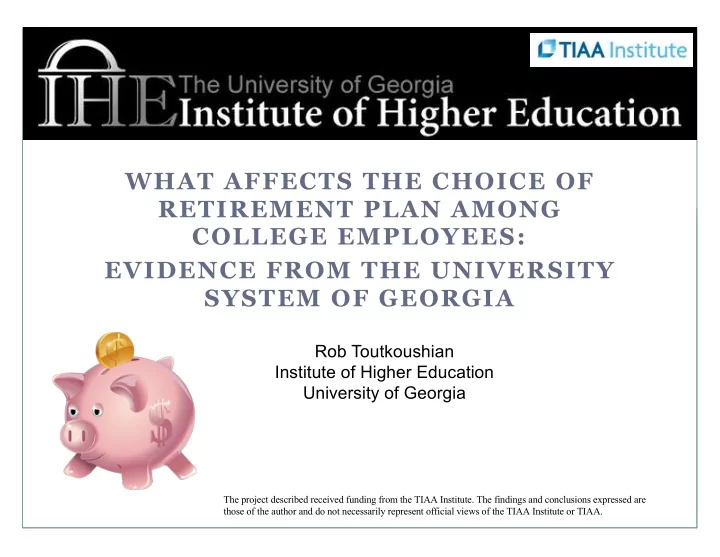

WHAT AFFECTS THE CHOICE OF RETIREMENT PLAN AMONG COLLEGE EMPLOYEES: EVIDENCE FROM THE UNIVERSITY SYSTEM OF GEORGIA Rob Toutkoushian Institute of Higher Education University of Georgia The project described received funding from the TIAA Institute. The findings and conclusions expressed are those of the author and do not necessarily represent official views of the TIAA Institute or TIAA.
Overview Compensation is an important tool for institutions to attract and retain employees Most attention directed towards salary, but non- salary compensation is also important Retirement benefits can equal half or more of an employee’s lifetime compensation
Retirement planning can be complicated: Employees must make judgments about future events such as life expectancy, asset returns, career paths Risk aversion of the employee is a factor as well
Context for Study States and colleges are moving away from DB plans ¡ States have trouble raising enough $$ to guarantee payouts ¡ Prefer to give money to employees and eliminate risk to employer We know little about how employees value different types of retirement plans ¡ Usually offered either DB or DC by employer, but not both ¡ Choice of employer is a mix of salary, benefits, and other considerations ¡ Do certain types of employees prefer one plan over the other?
Current Study Statistical analysis of choice of retirement plan (DB versus DC) for employees in University System of Georgia Interviews with faculty who made the choice of DB versus DC within last four years
Why Study Georgia? USG employees are given the choice at time of hire of a DB or DC plan Both faculty and non-faculty staff have the option The DB and DC plans for USG vary significantly in terms of the vesting requirements
Overview of USG Plans Employee can lose lots of $$ in TRS plan if leave prior to vesting
Data Faculty and staff employed as of 2015-16 Spans 30 public institutions in University System of Georgia (most 4-year, some offer 2-year degrees) Source: HR legacy system for USG Samples limited to years when employees could choose between DB and DC plan (2009-2015)
Trends in TRS (DB) Enrollment Note: Time trends are different for faculty and staff
Key Findings: (1) males prefer DC, (2) blacks prefer DB, (3) US Citizens prefer DB, (4) middle-aged faculty prefer DB, and (4) interest in DC fell over time
Key Findings: (1) males prefer DC, (2) blacks prefer DB, (3) middle-aged staff prefer DB, (4) married staff prefer DB, and (5) interest in DC grew over time
Qualitative Evidence Interviewed 12 faculty members at one USG institution to learn why they selected their retirement plan Semi-structured interview protocol Faculty were hired within the last four years
Theme 1: Adequate Information – For Most Most faculty indicated that they received enough information to make an informed decision However, several international expressed difficulty with making the retirement decision
Theme 2: Career / Mobility A major factor in retirement plan choice was related to the faculty member’s mobility Difference in vesting requirements was a major point of focus
Discussion Movement away from DB plans may appeal to younger faculty; not as appealing for women and minority faculty More research is needed on the effects of specific parameters of retirement plans ¡ Vesting requirements ¡ Size of contributions ¡ “Fine print” items: keep or lose SS, caps on payouts, COL adjs
Discussion (cont’d) Faculty tend to be more financially conservative / risk averse ¡ Concern that giving too many options in DC plans may be confusing to faculty and staff Examine choice of default plan ¡ USG employees are defaulted into DB plan. Could move to default in DC plan. Hybrid plans (DC + DB) may be best; can appeal to different types of individuals
Recommend
More recommend